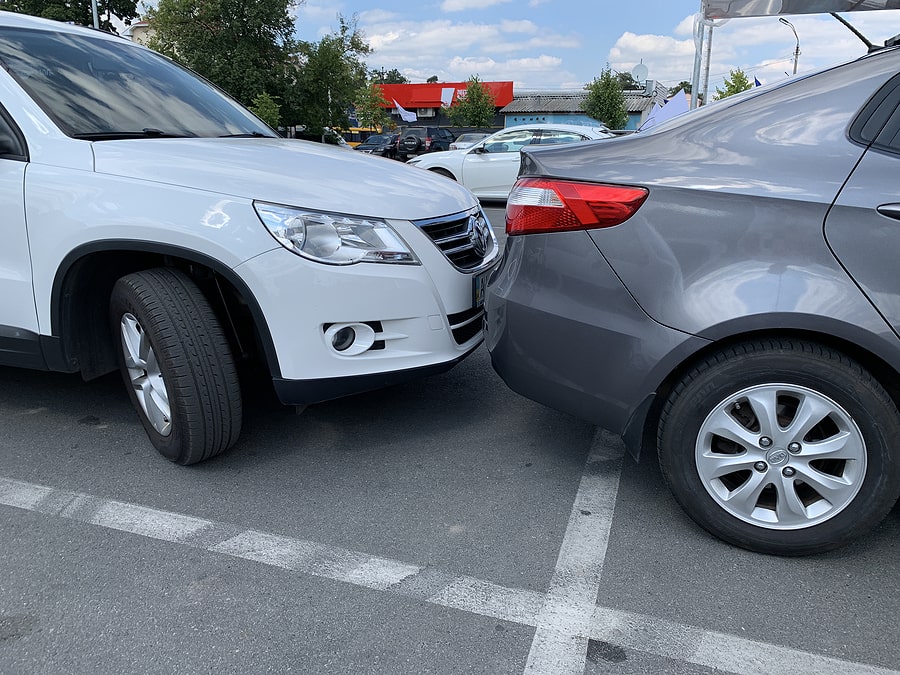After a car accident, money is at the forefront of any victim’s mind. After all, even if their injuries were minor, they’re dealing with medical bills, car repairs, and a serious disruption to their personal and professional life.
If you’ve never hired a lawyer or filed an insurance claim before, you may have no idea what to expect or how much money you are entitled to. The insurance company might reach out to you with a settlement offer, but where does that number come from? They don’t just pull it out of thin air!
As the bills pile up and your family suffers, you’re left to wonder “How much can I expect from a car accident settlement?” Should you accept the insurance company’s offer? What if it’s not enough?
How much to expect from a car accident settlement will depend on the unique circumstances of your crash. On this page we’ll give you a realistic idea of how much compensation an injured victim can expect from a settlement. Once you know how car accident settlements are calculated, you’ll know how to increase your chances of getting the amount you truly deserve.
First, let’s be clear about the terms and legal lingo we’re using: A settlement is an agreement to pay someone who has suffered injury or harm in a car accident or other personal injury matter. It is called a settlement because it settles, or closes, the case.
In order to reach a settlement, the injured person needs to either file a personal injury suit against the at-fault driver or file a claim with the at-fault driver’s insurance company. This is known as a third-party claim; a claim a victim files with their own insurance company would be a first-party claim.
For a driver to be found at fault, they must have been liable for causing the accident. Their actions must have been negligent in some way. There are tons of negligent actions, but they all have one element in common: they violated an appropriate, safe level of driving.
Table of Contents
How It Happens: Causes of an Accident
Drivers need to obey laws, be aware of traffic patterns, act sensibly, and make sure that their cars are safe to drive. Sounds simple enough, right? Failure to do one or more of these things constitutes negligence, and this careless behavior is why so many of our neighbors are seriously injured or killed on our roads every day.
One of the simplest examples of negligence occurs during one of the most common accidents. In driver’s ed, we’re all cautioned that drivers need to leave enough space in front of them to safely stop in case the vehicle in front comes to a sudden halt. It doesn’t matter whether the car stops short because a dog runs in front of it, another car suddenly changes lanes, the car turns a corner and sees a traffic jam, or even because the driver has a heart attack. If the driver has followed traffic laws and left enough space, the car in back should be able to stop in time!
However, as most of us know, it’s all too common for other drivers to tailgate and not leave enough space. This is why rear-end collisions are one of the most commonly occurring car accidents. While the law states that drivers shouldn’t follow too close, it’s nearly always the fault of the driver who hit the back of the other car—even if the other driver slammed on their brakes for no good reason. The driver in the back didn’t adhere to the law and is thus typically found at fault and held liable for any injuries stemming from the accident.
Rear-end collisions are just one of the potential cases we deal with on a daily basis. Other types of motor vehicle accidents include:
- Drunk driving accidents
- Distracted driving accidents
- Speeding accidents
- Head-on collisions and T-bone collisions
- Tractor-trailer truck accidents
- Rollover accidents
- Manufacturer defect accidents
- Accidents involving bicyclists, motorcyclists, or pedestrians
Determining Fault: Who Is Liable?
No matter what type of auto accident you were involved in, someone can be held responsible. There are several ways of determining who is at fault in an accident, but here are three steps you can take to begin the process and protect your rights.
- Call 911. Even if you don’t think you’re hurt, it’s wise to call 911 after a car accident. Law enforcement will arrive on the scene to look at the vehicles and talk to everyone involved. Officers will issue a police report including important details. A police accident report can be used as strong supporting evidence if you bring a case, either personal injury or an insurance claim.
- Take photos. If you’re able, snap photos at the scene of the accident right when it happens. Get the other car’s license plate number. Take close-ups and wide shots of the surrounding areas and any debris. Even small details like tire marks in the road or paint scratches on a car can show the path of the vehicles, the point of impact, and the speed at which they were traveling. All of this can help determine liability.
- Contact a car accident attorney. A car accident attorney can help you collect and preserve important evidence to prove who was at fault for your accident. They can also enlist the help of accident reconstruction specialists to figure out how your accident happened.
The more persuasive the case that the other driver was at fault, the better the chance of a fair settlement.
A settlement does not require a court trial. Even if you bring a personal injury case in civil court, it is very rare for car accident cases to go to trial. Why? Because early phases of the case usually provide sufficient evidence of who is at fault. The other side (the defendant) and the defendant’s attorney generally realize there’s no point in a court argument, because a judge and jury are unlikely to side with the defense. At that point, defendants are usually willing to settle, meaning you’re closer to getting the compensation you really need!
What’s Included in a Settlement?
When you are injured in a car accident where the other party is at fault, you are entitled to receive compensation for damages that you’ve suffered. There are three main categories of damages: economic damages, non-economic damages, and punitive damages.
Economic Damages
Essentially, economic damage applies to any accident-related expense or loss that can be appropriately quantified and proven with bills, receipts, or other documentation. This includes emergency room bills as well as losing days off work for medical treatment or recuperation. Economic damages can include costs for:
- Current medical bills. If you were hurt in a car wreck, you likely needed an ambulance ride, emergency care, surgery, hospitalization, doctor’s appointments, therapy, medication, and so on. If you work with a car accident lawyer from the get-go, they can connect you to the medical care you need at no upfront cost. With a legal document known as a “letter of protection,” your lawyer guarantees the medical providers will get paid later once a settlement is reached. However, if you’ve already paid out of pocket for medical care, you can still get reimbursed by including those bills in your case.
- Future medical bills. If you need future surgeries, therapy, or in-home care, your future medical expenses can be estimated and included in your claim.
- Property damage to your vehicle or other personal belongings. Remember, you have the right to choose your own auto repair shop. Do not allow an insurance adjuster or tow truck company to pick one for you. If your car was totaled in the accident, you will receive compensation amounting to its current market value. If you lost other personal items in the crash, such as a phone or digital camera, you can be reimbursed for their replacement.
- Lost wages. If you’re badly injured, you’re probably not going to work. Pay stubs, time sheets, and letters from your employer can be used to verify your usual wages and how many hours or days of work you have missed due to the accident.
- Future lost wages and lost earning potential. If you have to modify your responsibilities at work or you can no longer work in the same role due to your injuries, you can collect compensation for lost earning potential. Your car accident lawyer can even bring in expert witnesses like economists to estimate your projected losses.
Non-Economic Damages
While the above damages have a paper trail of proof and a swarm of numbers, your pain and suffering doesn’t. It’s difficult to put a price tag on the emotional distress you and your family cope with after a traumatic car accident.
Non-economic damages exist to cover the emotional side of an accident and injuries. Non-economic damages are only available if you can first prove you were hurt. We can tell you from experience: sometimes these non-economic losses can be overwhelming and catastrophic.
Non-economic damages often include the costs of:
- Pain and suffering
- Disfigurement and scarring
- Disability
- Loss of consortium (physical affection from a spouse or partner)
- Loss of enjoyment of life
Punitive Damages
Occasionally, but not always, punitive damages may apply in certain cases of obscene carelessness. Also known as exemplary damages, these damages are not meant to directly compensate victims. Instead, they are meant to punish the reckless wrongdoer who hit you. You are more likely to receive punitive damages if the at-fault party was committing a crime at the time of the accident.
What Factors Impact the Amount of a Settlement?
Now that we’ve provided the background info, we can discuss how the amount of the settlement is calculated in a car accident.
Settlements in a car accident are definitely not one size fits all. In other words, a certain injury doesn’t equal a certain amount. There are many variables involved. Every accident victim will have a different experience. Even two people who suffer the exact same type of injury in a car accident will likely differ in the following ways:
- Length of time in the hospital
- Cognitive, physical, and behavioral impairments
- Time needed for recovery
- Interference with their ability to work
- Types of rehabilitative therapy required
- Permanent disability or scarring
- Emotional impact
Aside from how your body responds to an injury, the amount of a settlement depends on a number of other factors. This includes the sum of the bills you’ve received, your salary, expert testimony on whether you can return to work, expert testimony on expected future medical expenses, and the amount of pain and suffering you’ve endured and may, unfortunately, endure in the future.
Other factors may include the effect of the injury on your daily life, both now and in the future. The total settlement amount will also increase if punitive damages are added on; as we mentioned, this is sometimes the case if the other driver was egregiously negligent or if they committed a crime such as drunk driving.
Below are more factors that impact the average car accident settlement amount:
Number of At-Fault Parties
If another driver hits you on an empty street, you will probably only be seeking compensation from their insurance company. However, if you were hit by a commercial vehicle or involved in a multi-car pile-up, there may be multiple avenues for compensation. Your car accident lawyer will thoroughly investigate every possible option and find every liable party.
Policy Limits
Note that when you are filing a third party injury claim, you are limited by the caps of the other driver’s insurance policy. For example, in Texas the minimum car insurance requirement is 30/60/25, or:
- $30,000 for injuries per person
- $60,000 total per accident
- $25,000 for property damage
If your damages exceed these policy limits, you may be out of luck. For more information about your state’s car insurance laws and policy limits, call us now at 800-898-4877. Our lawyers have experience with car accident cases all over the country!
Severity of Injury
Obviously, a broken leg will merit more compensation than a sprained ankle. Some injuries, such as spinal cord injuries and traumatic brain injuries, can affect one’s ability to ever move independently again, which can affect both life activities and the ability to hold a job. These types of injuries are often called catastrophic injuries, simply because their impacts on all aspects of life are so great. Victims of catastrophic accidents may need medical care for the rest of their lives.
Your settlement amount will be higher for more severe or debilitating injuries. For serious brain injuries and paralysis, settlement amounts can reach hundreds of thousands or even millions of dollars.
Gaps in Treatment
It’s crucial to show a record of prompt and consistent medical care after your car accident injury. If you wait too long or miss appointments, insurance adjusters will claim that you aren’t “really” hurt!
Length of Treatment
Typically, a case cannot be settled until the victim has completed treatment. If you are severely injured, you may need multiple surgeries, but be aware that even minor injuries may require months of physical therapy. It is important to closely follow your doctor’s orders. Never rush through your treatment plan in hopes of getting your settlement check faster, as this is a surefire way to sabotage your case!
Statute of Limitations
Car accident claims have deadlines and time limits called statutes of limitations. If you miss this window of time, your case may be dismissed entirely and you will not be able to collect any compensation. Statutes of limitations for car accidents vary wildly depending on what state the accident happened in. The statute of limitations could be anywhere from one year to six years. In Texas, for example, the statute of limitations for a car accident is two years from the date of the accident. Act now; the sooner you do, the sooner your car accident lawyer can begin building your case!
Legal Fees
Personal injury attorneys often work on a contingency basis. This means their payment is contingent upon your success, and they do not get paid until you get paid. At the end of your case, they will deduct their attorney fees from your total settlement amount. This amount will be discussed at the start of your case when you are hiring your attorney.
Calculating Expenses
You’ve scrolled this far and are still asking “okay, but how much will I receive in a car accident settlement?” Unfortunately there’s no secret formula or magical calculator for finding the average car accident settlement amount. The outcome of each case will be just as unique as each victim. However, a car accident lawyer’s expertise can help you estimate the value of your case.
The first step is to calculate your economic damages. This is done by adding together all the bills for medical costs, expected medical costs, and property damage. Next, we add your existing wages lost from work and expected future lost wages. These numbers depend on how much you make, how long you were out of work, and how much longer you’re expected to miss work.
The second step is to review and calculate these damages based on a number of factors typically applied, as discussed above. These calculations can be extremely complex, and vary from county to county.
Here’s a tip: No matter how bad your pain is, insurance companies are going to downplay it!
It’s easier to understand if we look at an example. Let’s say that you fractured your left arm in a car accident caused by another driver. Your medical bills are $5,000 in total. When an insurance adjuster looks at the breakdown of economic costs, they see a minimal number of events. In their view, there’s just an ambulance to the hospital, treatment for your arm, prescription medicine for the pain, and perhaps one or two days lost from work.
However, the accident was traumatic for you. You’re depressed. You still can’t play your favorite instrument or lift your children. We know this, but in the view of the insurance companies, given the severity of some other injuries in car accidents, the pain and suffering that you faced was comparatively minimal. The insurance company will treat you like just another case number, offering you the smallest possible amount they can and hoping you’ll sign away your rights. This is why you need a car accident attorney who will treat you with the respect and compassion you deserve during this difficult time.
Other Factors & Medical Care

Can any other factors affect the amount of the settlement? Although the procedure is essentially as we outline it here, yes, many factors can affect the amount of the settlement.
Often, insurance companies will look at where the accident occurred, and who the parties are that are involved. While it’s not right or fair, the insurance companies can sometimes value claims less simply based on the demographics of the parties involved.
The time and location of your accident also matter. Was it dark or raining? Was a street sign or traffic light obscured or broken? All these factors and more come into play. Your best bet is to get a qualified and experienced attorney involved as soon as possible after an accident, so they can guide you through the process and advise you how to best maximize your recovery.
See a medical professional as soon as possible after a car accident. A doctor should check you out thoroughly. You don’t have to be bleeding to be severely hurt; some dangerous injuries such as punctured lungs or concussions present no noticeable symptoms initially. Many people don’t realize that the pain or ache they feel after a car accident is actually a serious injury with devastating effects.
While the primary reason to see a doctor immediately is for your health and safety, you also want to avoid being in the position of an insurance company perceiving the lack of medical attention as a sign you weren’t severely injured. They’ll do anything they can to dismiss, diminish, and invalidate your pain. Ensuring the prompt diagnosis and treatment of your injuries is usually the key component to recovering everything to which you are entitled! Trust us, patience pays off.
What If the Insurance Company Refuses to Offer a Fair Settlement?
After you’ve been through the ordeal of a car accident and been in contact with the insurance companies, you might receive an insultingly low offer from them.
Never settle for less than you deserve.
Your settlement amount can increase depending on the negotiating skills of your attorney. A good car accident lawyer will keep negotiating until a fair offer is received, and not just settle immediately. Why? Because the amount of a car accident settlement is determined by looking at averages of other settlements and resolutions for similar incidents with similar injuries in the same venue. A car accident attorney can significantly increase your settlement offer. Best of all, we work on a contingency basis. This means we charge you nothing up front; we only get paid if you get paid!
Hire A Car Accident Lawyer Now
Check out our testimonials to see what we can do for you. If you need further assistance and advice, please feel free to contact us.
.






